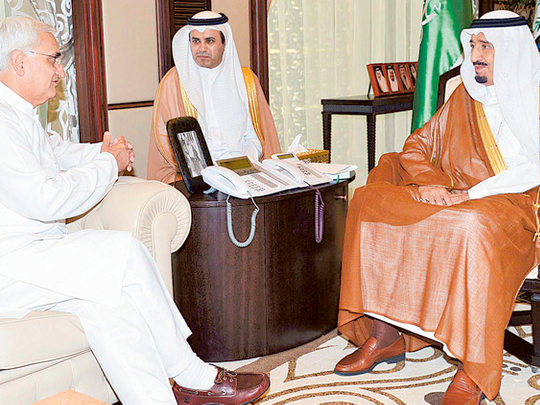
Jeddah: Indian External Affairs Minister Salman Khurshid is here to discuss matters of bilateral interest, including the Nitaqat law, as the Indian missions in Saudi Arabia scramble to help over 55,000 Indian workers leave the kingdom in adherence to its new stringent work policy.
Khurshid, who arrived here on Friday, was welcomed by Saudi Deputy Foreign Minister Prince Abdul Aziz Bin Abdullah. In his arrival statement, Khurshid said his visit was taking place “at a time when the Indian community in Saudi Arabia is engaged in an effort to utilise the three months grace period announced by His Majesty [King Abdullah Bin Abdul Aziz] for the expatriates to correct their legal status or to return to their motherland without penal action and with dignity”.
Before leaving for Jeddah, Khurshid said over 56,700 Indians are being repatriated from Saudi Arabia in the next one and a half months as they have no valid passports and legal permits to stay in the kingdom.
“As of now 56,700 Indian have registered with the Indian Mission for getting exit permit as they have no valid passports or other travel documents,” Khurshid on Friday told a group of Urdu editors in New Delhi.
The number is expected to grow.
On May 21, Indian Ambassador Hamid Ali Rao met the Saudi Deputy Minister for Interior Ahmad Al Salem during which they discussed the welfare of the Indian workers, including facilities for immigration and ‘exit’ for Indian nationals.
Kerala, which sends over 500,000 workers to Saudi Arabia, will not be affected much due to the Nitaqat policy, according to C.P. John, member of the Kerala State Planning Board.
Around 10 per cent of the Indian workers hit by Nitaqat would be Malayalis, John told IANS.
“Most Malayalis have been adhering to the laws, so not many would be affected,” John said.
While Nitaqat would hit Indian workers in cities and towns, there are thousands of Indians, mostly from Kerala, who have been staying in the kingdom for a few generations in far-flung rural areas.
“These Indians work on farms and are also involved in camel rearing,” said John.
The Indian embassy has also roped in a large number of Indians as volunteers to man the help desks in various cities of Saudi Arabia, especially for translation and interpretation work.
Khurshid is to hold talks with his Saudi counterpart Prince Saud Al Faisal, as well as Labour Minister Adel Fakih. The two sides will also discuss other issues of bilateral interest, including energy and counter-terrorism.









